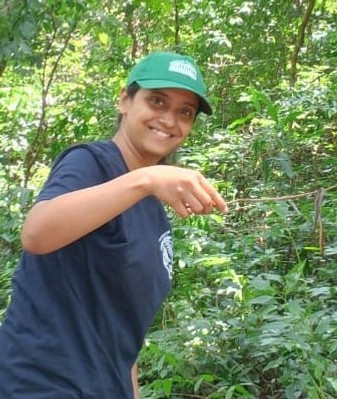
Dr. Deyatima Ghosh
Assistant Professor
Centre for Urban Ecology, Biodiversity, Evolution and Climate Change (CUBEC)
Jain (Deemed-to-be-University)
Bengaluru, Karnataka, India.
deyatima@atree.org
+91 9051988029
I am an ecologist. I joined Jain University in 2025 as an Assistant Professor in the Centre for Urban Ecology, Biodiversity, Evolution and Climate Change (CUBEC). Prior to joining CUBEC, I served as a Visiting Faculty in the Biology Department at the Indian Institute for Science Education and Research (IISER) Berhampur. Before this, I completed my postdoctoral research at Nanjing Forestry University, Ashoka Trust for Research in Ecology and the Environment, and the University of Lincoln, UK.
Research interests and themes:
In my Animal Behaviour and Cognition in Conservation (ABCC) research team, I focus on understanding how animals do what they do and exploring the interface between ecology, animal behaviour and cognition.
I have three main research areas:
1. Animal cognitive ecology
I am interested in understanding the ecology and cognition of animals. Although I love reptiles and amphibians, I also explore cognition across taxa, including primates and birds. The aim is to understand how animals process the information available in their environment and how they cope with challenges such as urbanisation, climate change, and habitat alteration.
2. Evolution of cognitive traits
As an extension of my previous research theme, I am keen to explore the evolution of diverse cognitive traits (decision-making, risk-taking, personality, learning etc.) across species, particularly in frogs, salamanders, caecilians, and reptiles. These groups are significant as they are less studied and also represent basal vertebrate lineages, and studying their cognitive abilities can provide valuable insights into the early origins of traits that are more fully developed in humans.
3. Conservation Behaviour
Here at CUBEC, I am initiating research in conservation behaviour to promote animal-centric conservation strategies by integrating animal behaviour and cognition into the protection of species and the ecosystem services they support. As a relatively young field—just around 35 years old—conservation behaviour is increasingly relevant in today’s context, where anthropogenic approaches must evolve to incorporate more trait-based, species-informed strategies for effective conservation outcomes.

.png)